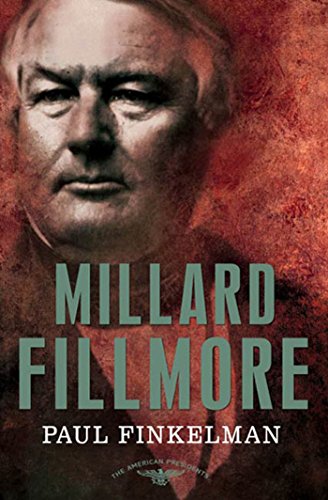“May God save the country, for it is evident that the people will not.”
Millard Fillmore, throwing shade on the Polk Administration
I come to bury Millard Fillmore, not to praise him. Those could have been the opening lines of Paul Finkelman’s biography of the 13th President. Many biographers so far have toed the line of fanboy and some outright dove into sycophancy. Finkelman has no such agenda. Sooner than later I began to look for the dead horse being beaten atop Fillmore’s grave.
We’ll start on a positive note, however, given Fillmore’s penchant for libraries. The young New Yorker did not read any book save the Bible until he was 17. At 18, Millard spent what little money he had to join a private library and read voraciously. His love of books was so strong that it was he who started the White House library. Despite very little formal schooling the author notes, “He was the son of a dirt farmer, a self-educated factory apprentice who had somehow become a lawyer.” Want to be successful? Get thee to a library!
So how did this blue-collar lawyer go from rags to presidential riches? Elected as Zachary Taylor’s running mate to balance the ticket geographically, MF took over the top job when Taylor died 16 months after his inauguration. Becoming VP was a circuitous path in itself. Daniel Webster turned it down, angered over not winning the nomination for President. William Seward (Lincoln’s future Secretary of State) was too strong against slavery. Thomas Ewing had a political rival secretly withdraw his name(!) and Abbott Lawrence was too controversial for the South. Fillmore beat out the rest because he never took a stand on any important issues and was considered inoffensive to all. He didn’t even meet Zachary Taylor until the eve of the inauguration.
It would be a tumultuous run in the Big Chair. Publicly, he was perfectly anodyne. Privately, Millard Fillmore was anti-Mason, anti-Catholic, anti-immigrant and anti-abolitionist. He didn’t like people who questioned the status quo. Failing even to get his party’s nomination in 1852 to defend his ascendant presidency, four years later he got the nod from the Know-Nothing Party, whose platform of nativism and party slogan of “Americans Must Rule America” feared foreign-born voters were “corrupting the ballot box.” His economic policy included support of a treaty with Switzerland for business and commerce but only to be conducted by Protestants. After his time in office he would support Andrew Johnson’s anti-black Reconstruction policies. But his most indelible mark would be left on a wide-ranging piece of legislation he helped push through Congress.
The Compromise of 1850 is a sterling example of how much power the slave-holding states held in antebellum Washington. Billed by some as a bipartisan effort to delay hostilities, I’m hard pressed see this set of laws as so rose-colored. The North got hosed. The bill granted California free statehood and ended the public slave trade in the nation’s capital. (Crucial distinction: it only ended the trade, not slavery itself. Plus, the trade continued just over the river in Virginia). For these mild concessions, the South got a strict Fugitive Slave Act, slavery in the expansive western territories won during Polk’s term and obliteration of the Missouri Compromise line. Zachary Taylor, as a Whig, would have almost definitely vetoed the bill; but Old Rough and Ready wasn’t around anymore. It was Millard Fillmore’s call now. With the help of Democratic Senator Stephen Douglas of Illinois, these piecemeal bills were accomplished with (albeit nominally) an opposition party president.
The Fugitive Slave Act of 1850 is especially heinous. Doggedly pursued by Fillmore, judges could be fined $1,000 if they failed to execute the law. Federal commissioners were assigned all over the North, paid via the taxpayer’s dime to hunt down not just escaped slaves but common citizens aiding and abetting runaways. The runaways were arrested and the citizens faced fines of up to $1,000 and six months in jail. (For reference, in today’s money that fine would be well over $30,000) The law did not allow writ of habeas corpus (guaranteed by Article I, Section 9 of the Constitution), a jury trial (granted by Article III, Section 2/the 6th Amendment) or, worst of all, “In no trial or hearing under this act shall the testimony of such alleged fugitive be admitted as evidence.” WHAT!?!?!? A free black man could be kidnapped, taken to trial, not allowed to speak and sentenced to “return” to the South as an escaped slave. Unbelievable. No wonder 12 Years a Slave won all those Oscars.
One of the few presidents to be raised in poverty, Millard Fillmore worked hard and dug himself out of the muck to become a four-term Congressman, a decent lawyer and such a bland and non-committal politician he wound up vice president. By a twist of history (or, rather, a tainted White House water supply) he became the President of the United States. The forgettable president with an unforgettable name was wholly unfit for the position he inherited and his leadership (or lack thereof) bore witness to this. While he never owned a slave he was a bigot and a racist, a doughface copperhead whose crowning achievement seems to be that Queen Victoria thought he was handsome.
Trivia
- Abigail Fillmore was the only First Lady before the 20th century to work outside the home after marriage (Teacher)
- In fact, she was Millard’s teacher when they met!
- Serves three one-year terms in NY Assembly in Anti-Mason Party
- 1836-40 – wins three terms as Congressman running as a Whig
- Chancellor of University of Buffalo; holds position from 1846 through the rest of life
- 1856 – nominated for the anti-Catholic, anti-immigrant Know Nothing Party; only wins Maryland (ironically founded as a haven for Catholics)
- Daniel Webster was his Secretary of State and his closest advisor
Follow-Up Reading
- Millard Fillmore: Biography of a President by Robert Rayback
- America’s Great Debate by Fergus M. Bordewich
- The War Before the War by Andrew Delbanco

